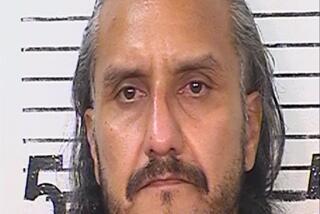Witness Denounced in Trial of Reputed Mexican Mafia Chief
A defense lawyer said Thursday that reputed Mexican Mafia leader Mariano “Chuy” Martinez had nothing to do with the execution killings of three men in a Montebello auto body shop, and he denounced the prosecution’s star witness as an “unmitigated, shameless liar.”
Max Torvisco, who once served as Martinez’s right-hand man, had testified for the government that Martinez orchestrated the killings over a walkie-talkie, instructing his henchmen to leave no survivors.
In his closing argument to a federal jury, defense attorney Mark Overland lashed out against Torvisco, 24, who negotiated a still-secret plea agreement in exchange for his cooperation.
Martinez, 42, is charged with running a drug-related racketeering enterprise and faces a possible death sentence if he is convicted. He is the first death penalty defendant to be tried in Los Angeles federal court since 1950.
Martinez and Torvisco were among 43 reputed Mexican Mafia members and associates indicted early in 1999. Nine have already been convicted of crimes ranging from racketeering and drug trafficking to murder conspiracy.
Overland said Thursday that Torvisco sought out a deal with prosecutors shortly after his arrest, and told them what he thought they wanted to hear in order to escape a possible death sentence himself.
Torvisco, an articulate onetime student at Cal State L.A., acknowledged on the stand that he had ordered as many as 140 killings while a Mexican Mafia member.
Reading from transcripts of FBI wiretaps, Overland cited instances in which Torvisco delighted in learning that his victims suffered agonizing pain while being stabbed or beaten. On one tape, he could be heard laughing.
Although Martinez brought Torvisco up through the ranks of the gang and referred to him as “my son,” Torvisco admitted in court that he was planning to assassinate his mentor shortly before their arrests. Asked during cross-examination if he felt any qualms about it, he replied, “No. It was just business, nothing personal.”
In contrast, Overland told the jury, Martinez eschewed violence. Martinez, he said, used his power as a Mexican Mafia leader to force Latino street gangs in Los Angeles to put aside their turf battles in the interest of neighborhood peace.
While Martinez was not always successful, the defense lawyer said, his efforts led to a drop in drive-by shootings and injuries to bystanders.
In her closing argument Wednesday, Assistant U.S. Atty. Susan Barna described Martinez’s peacemaking efforts as disingenuous. She said he wanted the neighborhood gangs to suspend fighting so they could refocus their energy on drug trafficking. The Mexican Mafia, also known as La Eme, required each street gang to turn over a share of its drug proceeds or face retribution.
Overland acknowledged Thursday that Martinez’s peace program “did have a dual purpose: to organize the gangs and collect more ‘tax’ money, but also to stop the gang-banging and the killing of innocent people.”
In December 1997, Martinez survived an assassination attempt, allegedly ordered by a Mexican Mafia archrival, John Turscak. Martinez was wounded in the arm, and his fiancee narrowly missed being shot.
Instead of retaliating in kind, Overland said, Martinez set up a meeting with Turscak in a passenger lounge at Los Angeles International Airport. He chose the location because both men would have to pass through metal detectors.
Although their talk accomplished nothing, Overland said the episode demonstrated Martinez’s abiding distaste for violence.
The defense contends that any violence committed or ordered by Martinez was carried out in self-defense against Turscak, who declared war on Martinez’s allies on the street and in the Los Angeles County Jail.
During all that time, Turscak was a paid informant for the FBI. He began cooperating with the government in April 1997, but was subsequently dropped when FBI agents learned he had plotted to kill Martinez and his associates while on the government’s payroll.
Richard Serrano, who was shot to death while on his knees in the Montebello auto body shop, was a major drug dealer and close associate of Turscak, according to prosecutors. The other two victims were said to be innocent bystanders.
Overland plans to focus on the role of Turscak in the case when proceedings resume.
More to Read
Sign up for Essential California
The most important California stories and recommendations in your inbox every morning.
You may occasionally receive promotional content from the Los Angeles Times.










